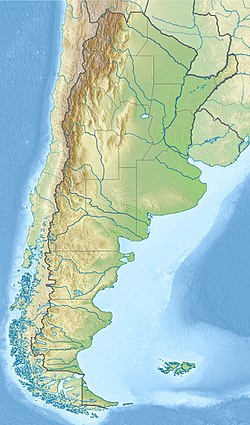Sierra Bayas Group
| Sierra Bayas Group | |
|---|---|
| Stratigraphic range: Neoproterozoic | |
| Type | Stratigraphic group |
| Underlies | Cerro Negro Formation Balcarce Formation |
| Overlies | Buenos Aires Complex |
| Lithology | |
| Primary | Limestone, shale (inc. argillite), quartzite, dolomite, quartz-arkose |
| Other | Diamictite |
| Location | |
| Coordinates | 37°19′00″S 59°08′00″W / 37.316667°S 59.133333°W |
| Region | Buenos Aires Province |
| Country | |
| Extent | Río de la Plata Craton |
| Type section | |
| Named for | Sierra Bayas |
Sierra Bayas Group is a group of sedimentary rock formations in Buenos Aires Province, Argentina, that deposited in Neoproterozoic times. The group crops out in the central and northwestern parts of the Tandilia System, a chain of hills made up by of ancient rocks. The nearby Cerro Negro Formation aside, Sierra Bayas Group contains the oldest sedimentary formations in Argentina that have not been subjected to in a significant degree the geological processes of metamorphism and deformation.[1]
Description[edit]
Sierra Bayas Group and the former La Tinta Group have equivalents in Southern Africa, in La Tinta Group in particular is considered equivalent to the Nama Group found in Namibia and South Africa.[1][2] From top to bottom Sierra Bayas Group is subdivided Loma Negra, Olavarría, Cerro Largo, Colombo and Villa Mónica formations.[1] Sierra Bayas Group has a thickness of 175 meters[2] and the age its rocks range from Tonian[3] to Ediacaran.[4]
It was formerly grouped together with Cerro Negro Formation and the Ordivician Balcarce Formation into La Tinta Group.[2]
See also[edit]
References[edit]
- ^ a b c Arrouy, M. Julia; Poiré, Daniel G.; Gómez Peral, Lucía E.; Canalicchio, José María (2015). "Sedimentología y estratigrafía del Grupo La Providencia (nom. nov.): cubierta superior neoproterozoica, Sistema de Tandilia, Argentina". Latin American Journal of Sedimentology and Basin Analysis (in Spanish). 22 (2).
- ^ a b c Bossi, Jorge; Cingolani, Carlos (2009). "Extension and general evolution of the Río de la Plata Craton". Developments in Precambrian Geology. Vol. 16. Elsevier. pp. 73–85. doi:10.1016/S0166-2635(09)01604-1. ISBN 9780444532497.
- ^ Kawashita, K.; Varela, R.; Cingolani, C.; Soliani Jr., E.; Linares, E.; Valencio, S.A.; Ramos, A.V.; Do Campo, M. (1999). Geochronology and chemostratigraphy of "La Tinta" Neoproterozoic sedimentary rocks, Buenos Aires Province, Argentina. II South American Symposium on Isotope Geology, Brazil. pp. 403–407.
- ^ Pazos, P.J.; Rapalini, A. (2011). "The controversial stratigraphy of the glacial deposits in the Tandilia System, Argentina". Geological Society, London. pp. 565–569.
{{cite book}}: Missing or empty|title=(help)

